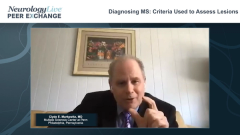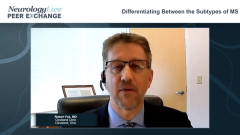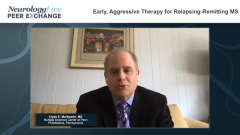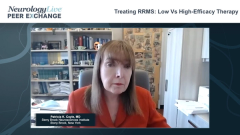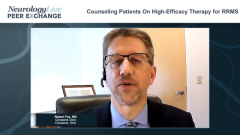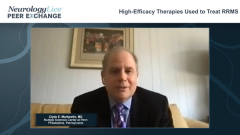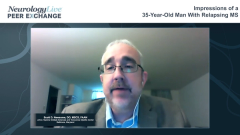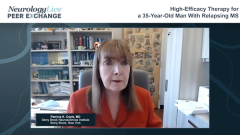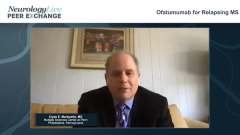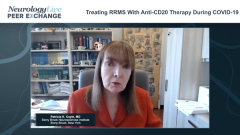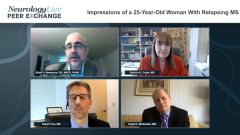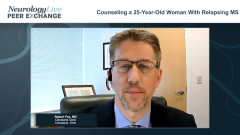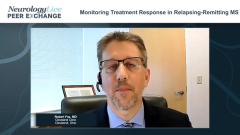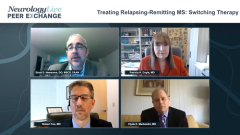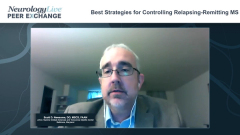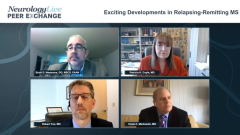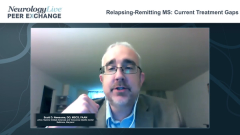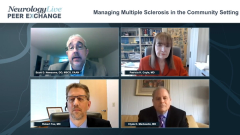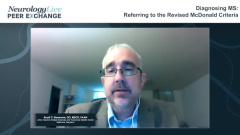
Treating RRMS: Low Vs High-Efficacy Therapy
Dr Patricia K. Coyle, of the Stony Brook Neurosciences Institute, comments on her approach to selecting first-line therapy to treat relapsing-remitting multiple sclerosis, explaining how she selects between a lower-risk or high-efficacy therapy.
Episodes in this series

Scott D. Newsome, DO, MSCS, FAAN: I want to hear from Pat because I have heard her speak in different venues about treat-to-target and learning from our rheumatology colleagues, in terms of how what we do up front may make a difference on the back end. Pat, when you are considering treatment for the individual sitting in front of you, what is that dialogue? What do you consider? Do you go for a low-efficacy therapy for most people, or are you starting to consider what Clyde mentioned: a more aggressive treatment approach? Maybe you uniformly start people on a specific treatment strategy? What is your approach?
Patricia K. Coyle, MD: A fundamental therapeutic principle is always early treatment in MS [multiple sclerosis]: treatment at a young age. That is incredibly important, and it is probably a key component. Virtually every study finds that a subset of individuals who got earlier treatment are doing better later. That is key. You want to treat early.
You have to look at the totality of the patient as well. One of the problems with MS is accelerated aging. People are not going to age as well. It is important to discuss this with individuals up front. Are there things they can choose with regard to lifestyle choices that can help boost or preserve CNS [central nervous system] repair? This is where you have a dialogue about wellness, looking to see if there are comorbid conditions that can additionally assault the CNS along with MS, so emphasizing how important it is to control that is absolutely key.
You then look at what you choose as you are trying to personalize the optimum disease-modifying therapy [DMT] for that individual. There are obviously drug, disease, and patient factors as well as more practical ones. Some patients have highly active MS. One of the typical features of MS is the variability: no 2 patients are alike. The mildest end is the silent people who have pathologic MS that is not picked up except at autopsy. That may be up to 25% of individuals with MS. That is the mildest end of the spectrum, but there is also the acute, aggressive Marburg multiple sclerosis at the worst end of the spectrum. If somebody has highly active disease, which is less than 10%, or if somebody has a bad prognostic profile, you are worried about them. They should be encouraged to go on a high-efficacy treatment. There is absolutely no doubt about that.
In shared decision-making, if the patient prioritizes efficacy of their DMT as a key component, then that might be a justifiable reason to use it even if you did not consider that they had highly active disease or a poor prognostic profile. I am not ready yet; the evidence is not there to say that every patient with MS would benefit from going on a high-efficacy therapy, particularly because there are unknown late-term issues. Perhaps there are some issues with the COVID-19 vaccine based on what disease-modifying therapy you choose. It may turn out that this is better. As you very well know, because you are involved, there are some ongoing prospective PCORI [Patient-Centered Outcomes Research Institute] funded studies that are randomizing that. Studies like the TREAT-MS trial and the DELIVER-MS trial are looking to see if you can document whether a group does better if they are randomized to high efficacy vs escalation or not. We are going to be interested in that objective, evidence-based data.
Scott D. Newsome, DO, MSCS, FAAN: I am glad you mentioned not taking a cookie-cutter approach. MS is definitely a heterogeneous disease, and we do not have the data. As you said, these PCORI-funded trials were conceptualized to try to answer the important questions. The pandemic aside, what always concerns me about some of the therapeutics that we have is the long-term effects. We have young patients, 20 to 30 years old, who are going to be on these therapies for decades. I imagine that knocking out certain immune cells for decades is probably not a good thing. We have some studies that have shown the consequences of that not only in MS but also in other diseases.
Thank you for watching this Neurology Live® Peer Exchange. If you enjoyed the content, and I hope you did, please subscribe to our e-newsletters to receive upcoming Peer Exchanges and other great content right in your in-box.
Transcript Edited for Clarity
Newsletter
Keep your finger on the pulse of neurology—subscribe to NeurologyLive for expert interviews, new data, and breakthrough treatment updates.

